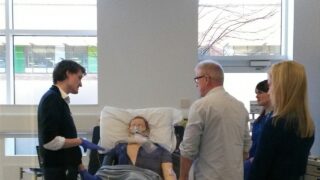Q Exchange
Delivering Hospital Grade Simulation Training in Primary Care
- Proposal
- 2019

What is the challenge your project is going to address and how does it connect to your chosen theme?
Multi-disciplinary high-fidelity simulation is well established in our acute hospital trust. We regularly use this modality to teach our own clinical teams as part of improvement work in sepsis, NEWS2, and in response to other learning needs identified by internal critical incident reviews and risk analyses. Evidence demonstrates that patient care is most effectively enhanced when teams train together; our recent work has focused on cutting across professional boundaries to invite individuals from multiple disciplines to undertake joint training in our state-of-the art Simulation Space and in active clinical areas as part of in-situ simulation exercises. The costs of resourcing and delivering simulation creates a barrier to smaller community teams benefiting from the opportunities for quality improvement it represents. Our challenge is to break down these barriers by transporting our equipment and expertise in simulation across the boundaries between Secondary and Primary Care.
What does your project aim to achieve?
The aim of this project is to enable Primary Care teams to benefit from our resources and expertise in the delivery of simulation training, improving their confidence and skills when managing critically ill patients, and building a community of practice which seeks to use simulation to identify future targets for improvement work. Individual community teams are not resourced to deliver in-house simulation, yet we know that hospital teams benefit from training via this modality. Our project is intended to connect their training needs with our capability to meet them, maximising the potential for benefit from our hospital’s significant investment in simulation equipment and faculty of the past few years. In order to measure the success of our project, we will undertake cycles of evaluation and refinement of our simulation training to maximise its potential for impact on the care teams deliver to patients.
How will the project be delivered?
We aim to purchase a portable medical simulator to allow our Simulation Nurse to work with colleagues in local GP practices, to identify and close performance gaps in specific clinical, technical, and team-working skills. In collaboration with the community team, they will design, deliver and refine a simulation training package using the new simulation equipment. The planning phase will involve the identification of SMART learning outcomes and the writing of simulations to deliver these. During the implementation phase, we will collect and analyse evaluation data to ensure we are meeting these outcomes, informing further development. Once honed, the training will be expanded to more GP surgeries, with ongoing cycles of evaluation to measure its impact. At all stages we aim to identify and train enthusiastic members of the community team in the skills necessary to design and implement their own simulation programmes, ensuring the project remains sustainable.
What and how is your project going to share learning throughout?
We plan to use multiple cycles of evaluation to refine our simulation offering to partner teams in Primary Care, sharing the results of these via an online dashboard made available to the Q-Network, and more widely via the Simulation Space at North Bristol NHS Trust website and social media accounts. At the end of the project, we undertake to present our work for publication and/or presentation for dissemination to the wider Q-community.
How you can contribute
- We are seeking assistance from the Q-Community in multiple areas.
- In particular, we are looking for networkers to help connect us with potential Collaborators in the local community, who might be interested in working with us to design, implement, and evaluate our simulation training package.
- We would also benefit from the help of a Fixer in the Q-Community who might be able to help us develop efficient ways to share the learning generated by this project.
- We welcome the insights of Experts and the advice of Critical Friends in evolving our project idea into a full proposal for consideration by the Q-Community.
- Finally, we hope our collaborative approach to delivering simulation training across the traditional boundaries of Primary and Secondary Care will encourage Promoters to share our idea and the learning it generates more widely with the Q-Community, and beyond.
Plan timeline
| 28 Jul 2019 | |
|---|---|
| 1 Sep 2019 | Purchase of new portable equipment |
| 1 Oct 2019 | Identify and plan pilot phase |
| 1 Dec 2019 | Deliver pilot training |
| 6 Jan 2020 | Refine and reproduce training at other practices |
| 1 Mar 2020 | Ongoing evaluation and refinement |
Comments
Anna Burhouse 9 Jul 2019
Hi Matt and Katherine,
great to see your idea here. It might it be worth connecting with Pam Moule at UWE about realist evaluation? Pam is amazing at thinking about how to evaluate this kind of work in a formative way.
Good luck
best wishes
Anna
Comments are now closed for this post.